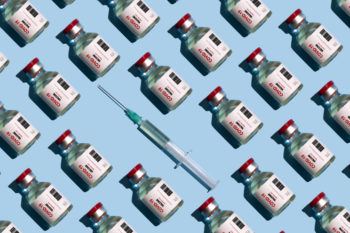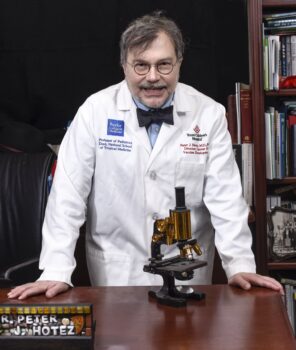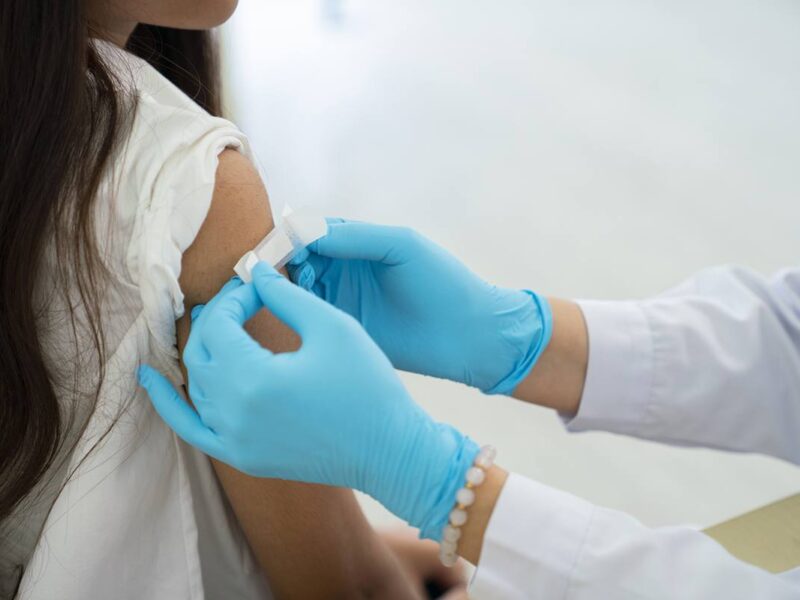How Can We Learn From COVID To Prepare For What’s Next?

Though the federal COVID-19 Public Health Emergency ended five weeks ago, the pandemic itself is far from over.
Meanwhile, there’s plenty of reason to suspect the emergence of yet another major pandemic in the not-too-distant future. No one is more familiar with that reality than Dr. Peter Hotez, dean of the National School of Tropical Medicine at Baylor College of Medicine, as well as a fellow at Texas A&M University’s Hagler Institute for Advanced Study and Scowcroft Institute of International Affairs.

Texas A&M Today recently caught up with Hotez to discuss this latest chapter of the pandemic, future threats to public health, and the pressing need to address anti-vaccine rhetoric and other forms of misinformation.
As we continue to track the spread of COVID-19 in the U.S., what can we expect to see in the near term?
The good news is that the numbers seem to be going down in terms of new COVID cases. The wastewater numbers here in Houston, for instance, are going down. I think part of the problem, though, is we’re not collecting nearly as much data as we used to. We used to get regular state and national case reporting data, data on hospitalizations, positivity, wastewater analysis, and now we’re not getting as much of that information. So we could experience another wave this summer, like we did in the summer of 2020 here in Texas, and we may find out about it fairly late.
The bottom line is, this is your time to make certain you’re up to date on your boosters, especially the bivalent booster that confers immunity against the Omicron subvariants that are currently circulating. Not enough Americans have got it — only about 17% of those who are eligible. And even if you did get it last September when it first became available, it’s starting to wear off, so if you’re over the age of 65 or if you’re immunocompromised, it’s time for another booster.
Looking ahead, some models are predicting that we could see another winter wave. We just heard from the U.S. Food and Drug Administration about a fall booster that may become available, and we’ll see which groups are eligible to take it, but especially if you’re a senior, you should be looking at the possibility of three different vaccines this fall: One is the new COVID booster, second is your influenza shot and third is a new RSV vaccine that’s going to be available, so seniors will be eligible for that as well.
You’ve been stressing the importance of looking beyond COVID at what comes next. In your opinion, what kinds of public health threats should we be watching for in the coming years?
First, remember that COVID-19 is our third major coronavirus of the last 20 years. So don’t be surprised if there’s fourth major one emerging before the end of this decade.
Second, I’m always worried about avian and zoonotic influenzas or pandemic influenzas, so we need to be ready for that.
And then third, I’m worried about tropical infectious diseases. On the Gulf Coast and in Texas, we have a unique susceptibility to those because of our high levels of poverty and climate change and urbanization, which is the reason we set up our National School of Tropical Medicine here in Houston. I’m worried about dengue or Zika returning, as well as typhus and Chagas’ disease. (To learn more about these diseases, search on the Centers for Disease Control and Prevention website, or read this paper from the National School of Tropical Medicine on these diseases in Texas)
How can the U.S. adjust its approach to better prepare for these future pandemics?
I think the mistake that too many people are making is thinking that COVID was just a one-off, and that’s not the case. I think it’s part of a “new normal” of regular waves of pandemic threats. And that’s happening because of this confluence of shifting poverty and climate change, catastrophic weather events, urbanization and human migrations. So we should expect pandemics and health threats, like vector-borne diseases here on the Gulf Coast, to become part of the new normal and adjust accordingly.
The American people understand the importance of investing in defense. We understand the threats posed by Putin invading Ukraine or Xi posturing toward Taiwan. But now we have to start realizing that with pandemic threats and global infectious diseases, yes, they threaten public health, but they also destabilize economies and cause global insecurity.
We need to be prepared for a higher-level investment to develop countermeasures against that. We should be thinking about disease as more than a health threat and recognize them as economic and security threats.
Your next book is titled “The Deadly Rise of Anti-science: A Scientist’s Warning.” How can we understand the overall impact of anti-vaccine and other anti-science rhetoric during the COVID pandemic?
The number I come up with in the book is that 200,000 Americans, including 40,000 Texans, needlessly died because they refused the COVID vaccine during our terrible Delta and BA.1 Omicron waves in 2021 and 2022. This was at a time when vaccines were more than 90% protective against severe illness and death, and yet so many Americans needlessly died because they were hearing disinformation.
The anti-vaccine movement has shifted from the early 2000s with false claims that vaccines cause autism to becoming a political movement with a link to this concept of health freedom or medical freedom. All that rhetoric really did a lot of damage, especially in East Texas and Central Texas and the Panhandle, where almost every Texan knows someone, a loved one or a friend, who needlessly died because they refused the COVID vaccine. Those are the consequences.
We call it misinformation, or we call it an “infodemic,” but it’s none of those things. My book finds that it was organized, it was deliberate, it was politically motivated, and it killed Americans — it killed Texans. We have got to find a way to de-link the anti-science rhetoric from politics because it just doesn’t belong.
How will that kind of rhetoric impact our ability to respond to future pandemics?
As we get onto the other side of COVID, these anti-vaccine groups are not just going to fold up the tent and go home. They have political power, they have financial clout, and they’re supported at the highest levels of some elements of the government, so as new pandemics come through, this is going to be even tougher.
I’m definitely worried about that, and I’m worried about spillover into all childhood immunizations. I worry that we’re going to see a new normal where parents are no longer willing to vaccinate their kids against diseases like measles, whooping cough and tetanus, even polio — we could see the return of some of those illnesses as well.
Overall, I think this medical freedom framing is a false concept. We need to continue requiring childhood immunizations for school entry, because we know what happens when we stop doing that — we see terrible outbreaks of measles, and measles is a killer disease. So that remains essential.
For adult immunizations, that’s a much tougher issue. Even if we don’t require mandates, we should at least provide accurate health information. The problem that we faced during the COVID pandemic, and one of the findings in the book, is that nightly news anchors on Fox News deliberately filled their content with anti-vaccine statements falsely discrediting the effectiveness or safety of vaccines. So it’s not so much about mandates, it’s about finding ways to stop this anti-science aggression that came from some of our news outlets and elected leaders, because it killed people.
How can we begin to combat some of that anti-science rhetoric and provide reliable information to our communities?
We need to bring together people who think about other deadly, big-picture societal issues like suicide, traffic accidents or gun violence, and try to think of it from that standpoint. Because the numbers of Americans dying from this are right up there with any of those forces.
You never know what’s going to be a trusted source of information for people. It could be a local family physician, or an institution like Texas A&M, which has an incredibly strong reputation across the state of Texas, even in the areas I’ve mentioned. That’s one of the reasons I’m so thrilled to have appointments with the Hagler Institute and the Scowcroft Institute at Texas A&M, because I think it’s important that A&M represents a really important voice for our state and for our region.





